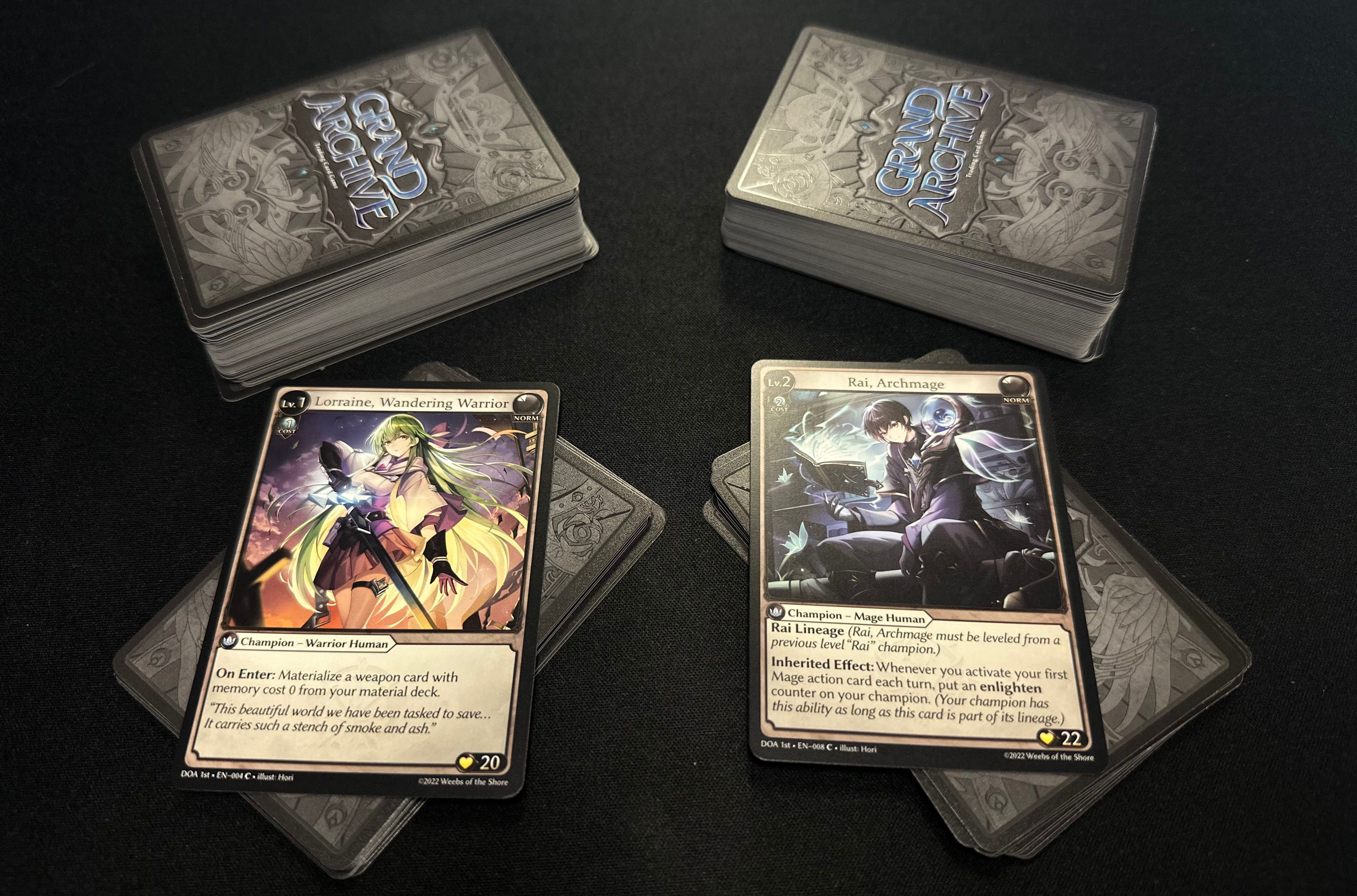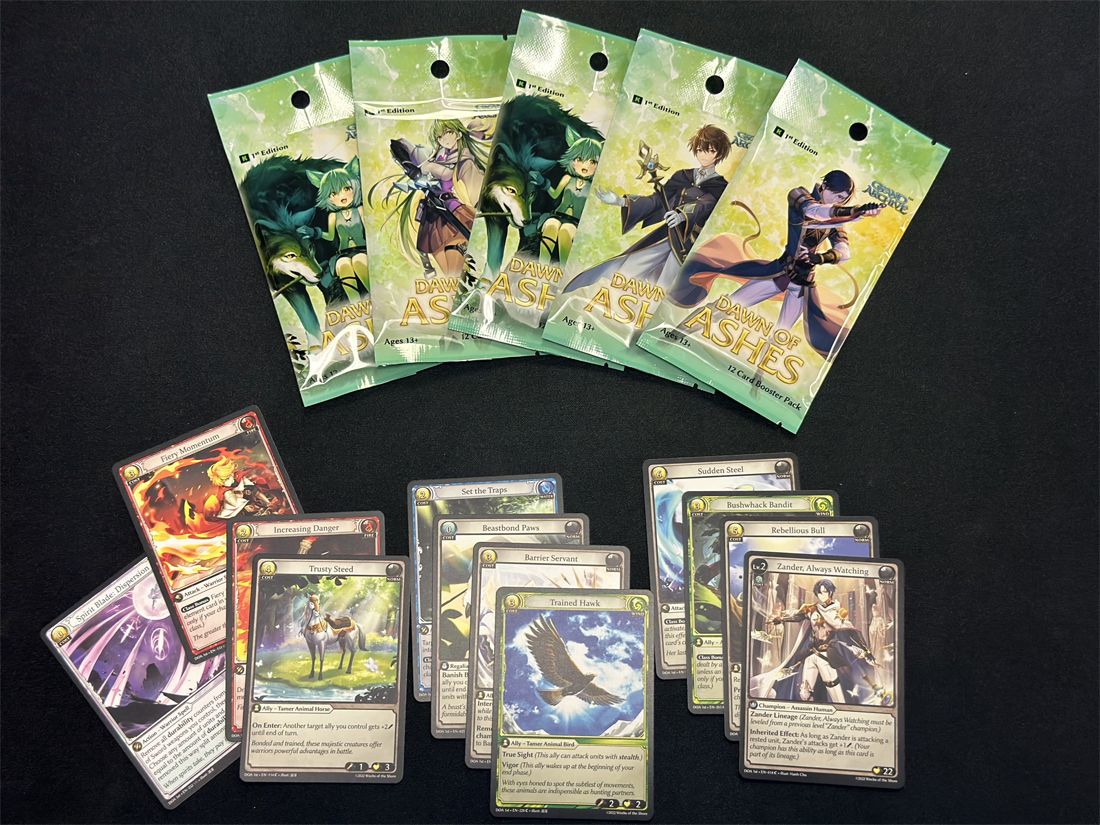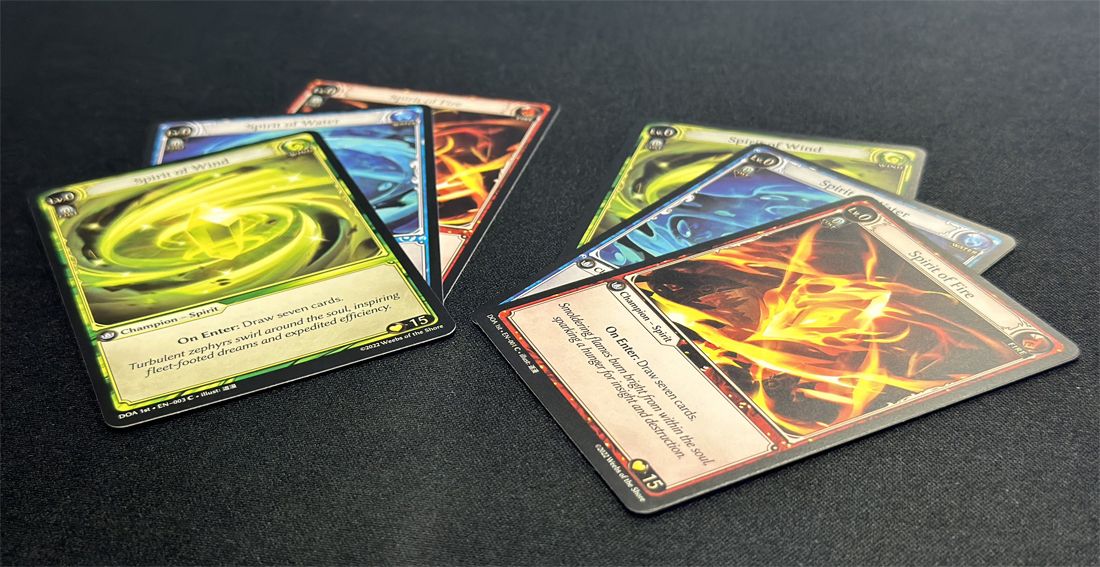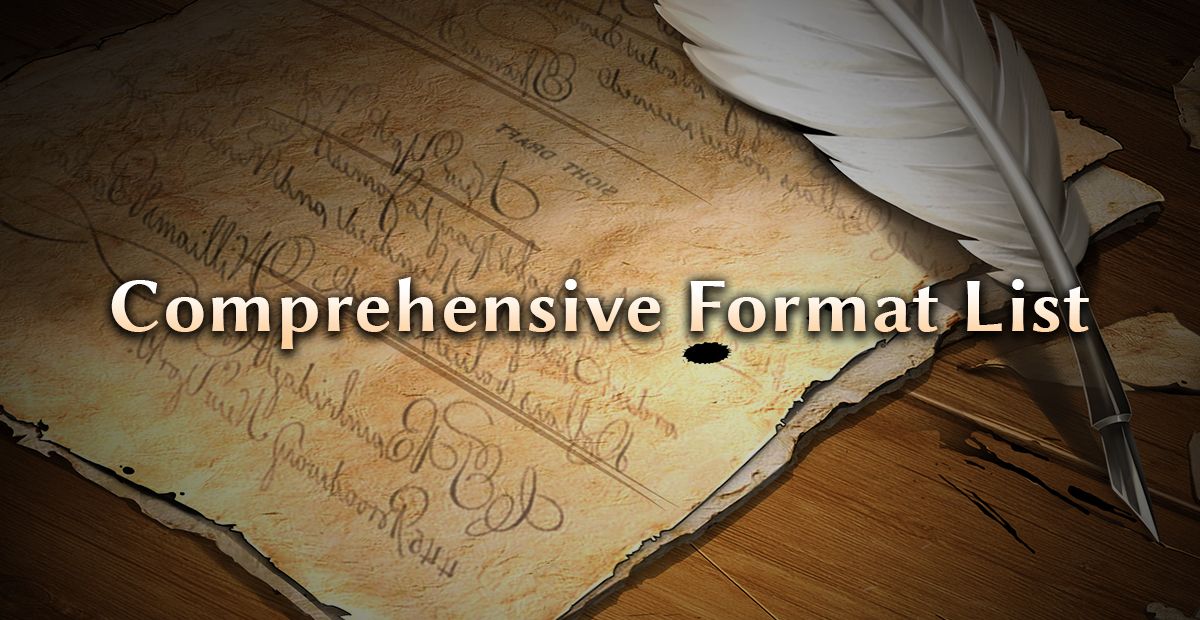In this article, we'd like to talk about the ways everyone can enjoy playing Grand Archive! There will primarily be two ways to play: Standard Constructed or Drafting. We'll start with discussing constructed standard play first.
 The constructed format for Grand Archive is the standard convention for the game: A 60-card main deck with no more than 4 copies of any card, and a material deck capped at 12 unique champion and/or regalia cards.
The constructed format for Grand Archive is the standard convention for the game: A 60-card main deck with no more than 4 copies of any card, and a material deck capped at 12 unique champion and/or regalia cards.
Two players each provide their own decks and decide who goes first, after which they can start playing Grand Archive! There is not much more to it than that. Most tournaments will likely opt for this format convention and can choose how the tournament is structured, including rounds, match structure (BO1, BO3, etc), sideboarding, etc. Our tournament policy and best practices article will discuss specifics and suggestions for how these events might be run.
Build your deck with a specific goal in mind! Not every deck wins the same way nor does each deck use the same tools to get the job done.
Diversify your threats! Having multiple strong cards that let you win the game means you're more likely to win!
Add interaction! Some decks will win faster than others and some might be more "inevitable." Ensure your deck can protect its route to victory against different strategies. Even if you don't use them, reactionary cards can still pay for other cards' costs.
Keep your material deck versatile! You get to materialize any one card from it every turn, so consider putting some situational cards for when you need them.
Don't overdo the number of advanced element cards in your deck! You still need to play cards until you're able to level up to your level 3 champion and you unlock those powerful cards.
The community is a resource! Is there a deck idea you want to try? See if anyone else has tried it before so you can refine the best deck possible.
Don't be afraid to innovate! There are many pairings of elements, champion classes, and advanced elements to make deck-building a unique experience for everyone!
 Regarding drafting, standard sets are made with drafting in mind with the idea that you can open packs in a group and make a deck with cards you select from each pack.
Regarding drafting, standard sets are made with drafting in mind with the idea that you can open packs in a group and make a deck with cards you select from each pack.
The rules of drafting are simple: We recommend 8 players and 6 packs per player. Players first sit in a way where each player has a player to their right and one to their left. All of the packs are shuffled together before being split between each player. Each player opens one of the 6 packs, picks one card, and passes the remaining cards to the right. After there are no more cards to pick from, each player opens the next pack and repeats the same process, but passes cards left instead. This is repeated, alternating passing of cards right and left until cards from all 6 packs are chosen. From these cards, players must make a main deck with a minimum of 30 cards and a material that has no upper limit on quantity. Players can add one level 0 spirit champion for free to their material deck of either the "Spirit of Fire", "Spirit of Water", or "Spirit of Wind".

As opposed to constructed decks, draft decks have no constraints on having more than 4 copies of cards in the main deck and players can have any number of the same card in their material deck! You pick cards face-down, so no one else knows what you took! Drafting is also another way to support tournament play!
Alternatively, to save time, players can play a hybrid draft format where each player initially opens 3 of their packs and then the other 3 packs are drafted normally. It is possible to draft either way using 4 players, but using all 6 packs in a draft is still recommended. No matter which way you play, we're sure you'll have fun!
Don't feel too pressured to commit to a champion early! The lineage champions in a standard set are included with a champion in each pack. Additionally, standard sets may include some "lineage break" champions that let you switch classes or level up dynamically without relying on drafting each champion in a complete lineage!
Cards are only element-restricted, not class-restricted! The only thing that matters for your class is the class bonus found on some cards, but most cards are still effective without that bonus. The ability to play the cards your draft of a certain element will only depend on the level 0 champion you are allowed to add to your material deck after drafting is over.
Make sure you draft enough allies; after all, you have to deal enough damage to your opponent's champion to win while protecting your own!
Generic attacks can be good removal; even mages aren't afraid to pick up a sword once in a while.
Draft enough regalia to utilize your materializations over the game. You might fall behind if you don't have anything to materialize!
Balance an expensive material deck with plenty of floating memory cards in the main deck!
Read the signals! Are there plenty of cards of a certain class or element coming back to you? That archetype might be more open than others and give you a good chance of making the best deck you can.
Standard Constructed
 The constructed format for Grand Archive is the standard convention for the game: A 60-card main deck with no more than 4 copies of any card, and a material deck capped at 12 unique champion and/or regalia cards.
The constructed format for Grand Archive is the standard convention for the game: A 60-card main deck with no more than 4 copies of any card, and a material deck capped at 12 unique champion and/or regalia cards.
Two players each provide their own decks and decide who goes first, after which they can start playing Grand Archive! There is not much more to it than that. Most tournaments will likely opt for this format convention and can choose how the tournament is structured, including rounds, match structure (BO1, BO3, etc), sideboarding, etc. Our tournament policy and best practices article will discuss specifics and suggestions for how these events might be run.
Deck Building Tips
Draft
 Regarding drafting, standard sets are made with drafting in mind with the idea that you can open packs in a group and make a deck with cards you select from each pack.
Regarding drafting, standard sets are made with drafting in mind with the idea that you can open packs in a group and make a deck with cards you select from each pack.
The rules of drafting are simple: We recommend 8 players and 6 packs per player. Players first sit in a way where each player has a player to their right and one to their left. All of the packs are shuffled together before being split between each player. Each player opens one of the 6 packs, picks one card, and passes the remaining cards to the right. After there are no more cards to pick from, each player opens the next pack and repeats the same process, but passes cards left instead. This is repeated, alternating passing of cards right and left until cards from all 6 packs are chosen. From these cards, players must make a main deck with a minimum of 30 cards and a material that has no upper limit on quantity. Players can add one level 0 spirit champion for free to their material deck of either the "Spirit of Fire", "Spirit of Water", or "Spirit of Wind".

As opposed to constructed decks, draft decks have no constraints on having more than 4 copies of cards in the main deck and players can have any number of the same card in their material deck! You pick cards face-down, so no one else knows what you took! Drafting is also another way to support tournament play!
Alternatively, to save time, players can play a hybrid draft format where each player initially opens 3 of their packs and then the other 3 packs are drafted normally. It is possible to draft either way using 4 players, but using all 6 packs in a draft is still recommended. No matter which way you play, we're sure you'll have fun!
